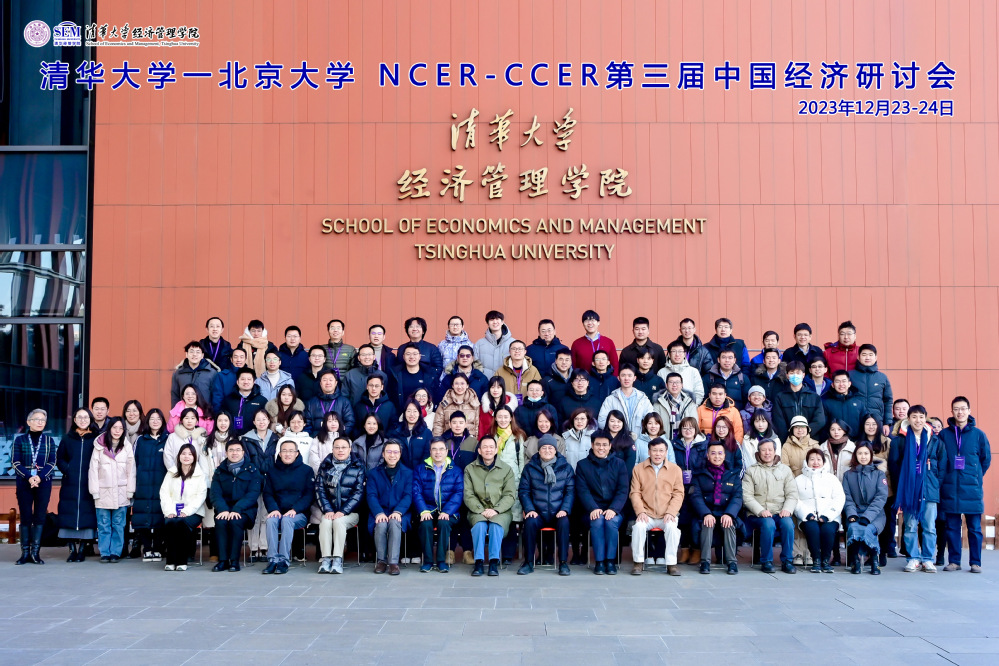ACCEPT researcher Li Bing delivers presentation on working paper at the 3rd Tsinghua University-Peking University NCER-CCER China Economic Symposium
On December 23-24, 2023, the 3rd Tsinghua University-Peking University NCER-CCER China Economic Symposium was successfully held at the School of Economics and Management, Tsinghua University. Li Bing, a researcher at Tsinghua University’s Academic Center for Chinese Economic Practice and Thinking (ACCEPT), attended the symposium and presented a joint paper with Professor David Daokui Li entitled “Why has the scale of government steadily expanded? Explaining Wagner's Law using the theory of labor efficiency and social contracts.”
The symposium was co-organized by the China Center for Economic Research (NCER) of Tsinghua University and the China Center for Economic Research (CCER) of Peking University, with event sponsors including the Hang Lung Center for Real Estate at Tsinghua University, Summitview Capital, Schwarzman College of Tsinghua University, China Economic Quarterly, China Journal of Economics, and China Economic Quarterly International. A total of 355 papers were received by the event co-organizers for consideration, with 72 of the submitted papers selected in the end for presentation at the symposium. During the two-day event, six scholars, including Zhang Junsen, Lu Yi, Lu Ming, Lu Pinyan, Liu Xuewen and Huang Wei, were invited to deliver keynote speeches.
During the symposium’s 7th session held on December 24, Li Bing first introduced the background and research motivation of the paper, which namely takes aim at explaining the fundamental reasons behind the expansion of the government’s size in major countries around the world during the process of industrialization as well as predicting the future trend for the changing scale of government over time. When it comes to this area of research, the existing literature tends to focus on state capacity, state functions, and the impact of war, among other related approaches, to provide an explanation. On a more foundational level, however, the paper presented at the symposium attempts to put forward a theory that can be applied more universally to explain the expansion in the scale of government – i.e., the theory of labor efficiency and social contracts. The theory first points out that the size of the government is essentially a public choice made by the whole society, which involves an arrangement, agreement or contract reached between the general public and the government of a state, none of which can be arbitrarily determined by either party unilaterally. At the same time, this theory points out that the core feature of economic development is the continuous rise in labor productivity, leading to a sustained rise in individual incomes throughout society, which in turn generates a corresponding increase in household consumption and leisure time. During the course of this process, the marginal utility of household consumption and leisure will continue to decline steadily, and at the same time, due to the gradual shift in society towards greater complexity, households will increasingly require the government to provide more public services, with the marginal utility of the government’s public services thereby undergoing an improvement correspondingly. Therefore, households are willing to sacrifice a certain amount of their income in the form of taxes that are collected and exchanged for commensurate public services provided by the government, in this way raising the overall utility and welfare of households. As a result, new forms of contractual arrangements are repeatedly established between the general public and a state’s political leaders, with the scale of government thus continuing to expand accordingly. As indicated in the paper, this theory supports the basic principle of Karl Marx's historical materialism wherein the economic base determines the superstructure. Li Bing also presented a concise model to illustrate this mechanism, in addition to making use of historical data and case studies from various countries to provide empirical evidence. As a direct corollary to the theory of labor efficiency and social contracts, and in view of the increasingly widespread adoption of the latest cutting-edge technologies as represented by artificial intelligence, the scale of government is expected to undergo a further expansion in future alongside a concomitant rise in labor efficiency. This conclusion is completely consistent with the proposal of a Universal Basic Income (UBI), which has become a widely discussed topic internationally in recent years.
At the end of the presentation, several scholars from Peking University, Wuhan University, Beijing Normal University, and the Central University of Finance and Economics each put forward their own questions regarding the paper and provided some additional constructive suggestions to make further improvements to the paper.

Li Bing, seen standing in the top-left of the last row, joins participants for a group photo during the 3rd Tsinghua University-Peking University NCER-CCER China Economic Symposium that was held at Tsinghua University's School of Economics and Management from December 23-24, 2023.




